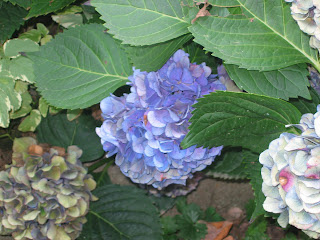
I read a beautiful quote this morning on the blog of a local Zen center down the street. I'm still trying to figure out where to practice, whether to practice, etc. and so I was checking them out and stumbled upon a new entry by their Sensei.
The quote was attributed to Yasutani Roshi, who said:
The fundamental problem for all humanity is that you believe that you are there and I am here.
Although the writer (the center's Sensei) was using this quote to illustrate a point about right action and economic compensation, it led me to think about something I've been mulling over ever since writing my post Death.
I was worried in the aftermath of posting, readers might find it cavalier or insensitive to those who have lost loved ones very close to them. I thought maybe my discussion about moving away from fear of my mortality might inadvertently suggest I fear death in no form... which is not actually true.
While I may be able to accept my death (my entirely hypothetical death - perhaps it would be different were it more near), I greatly fear the loss of my loved ones in death. Not only do I struggle with the thought of leaving them behind, but also with the prospect of losing those closest to me before I am ready to let them go.
Because we are never ready to let them go, are we? The Buddha is said to have communicated:
We must be diligent today.
To wait until tomorrow is too late.
Death comes unexpectedly.
The lesson he wished to convey through these words - it is thought - was the importance of dwelling in the now... being fully present in the current moment, rather than squandering the preciousness of life by remaining in the past or keeping one's mind on the future.
When I read it, the final line rang out to me like a small, clear bell: Death comes unexpectedly.
And so it does. Whether we have prepared for it or not. Whether we were given timelines, knew about the course of the sickness involved, or saw it inevitably looming ahead as age and frailty calmly and ceaselessly took their toll.
When I struggle with Buddhism, this is where I get stuck. The big, unyielding, and undeniably painful aspects of life from which no one is immune. How do I find inner peace when someone I love has died? How do I maintain calm, choose to be happy, or eliminate suffering when I am first-hand to the pain and suffering of someone I love? How do I stave off the fear that the people I value most will be lost... that I might be left to live without them?
My guess... it is as much a commitment and process as anything else in Zen or in life. Your grief is. Your pain is. Your fear is. And when it is not, it is not.
It took a long time for the chest-clenching sadness of my grandmother's death to subside. Several years. And looking back, I do wonder if perhaps I held onto it a bit longer than I truly needed to. I wonder if I carried it with me (that sadness and lonely longing linked to outrage and despair over her ending) longer than necessary because it was a way to stay connected to her. A way to hold on without letting go.
I find letting go very difficult. In many aspects of life. And so lately, I have started to turn my awareness to the times I am holding on. I try to ask myself: Does this help me or anyone else? Is this making my life richer, happier, or more fulfilled? Is this necessary for my growth or the benefit of another person?
And I'm sure you can guess the usual (quiet) response to those questions. No.
To circle back to the initial quote I mentioned... Yasutani Roshi points out that our thinking tends to separate self from other. We see ourselves and those around us as distinct and disconnected, which can allow for all number of cruelties should we fail to be mindful of our actions.
In truth, we are all connected. By our common humanity, by our shared biology and planetary ancestry, and by the infinitesimal atoms, strings, and hums through which our world is constructed.
On some level, there is no other. And so the reality of death is, we lose a part of ourselves. The me that is created in the combined presence of myself with my grandmother is no longer. That piece of me is gone and will never again be experienced.
The memories aren't gone; the lessons and gifts and heredity and jokes and unconsciously echoed aspects of her personality are all still with me. But the here-and-now experience of being with her... that is what I have lost. That is what I mourn, I believe, when I am in mourning.
And that is what I fear, I think, when I think of the loss that will inevitably reach other areas of my life.
May those grieving find peace with their loss over time. May we always remember to be present with all that is here, now.
